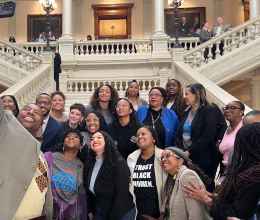
This week, we worked around the clock on Crossover Day as lawmakers rushed many bills to clear at least one chamber to survive the 2025 legislative session.
One major victory: The attempted ban on public schools and postsecondary institutions from supporting or maintaining diversity, equity, and inclusion (DEI) programs did not get a vote in the Senate. Laws that failed to pass Thursday could be resurrected this year, but passage is more difficult. The state operates on a two-year session, so Senate Bill 120 and others could also be considered next year.
We saw bills, many of which failed to cross over, which disregarded better solutions for people housed in deadly correctional facilities, attempted to force a specific religion upon grade school students, and weakened the state’s ability to maintain voter rolls. Many of the attacks mirror those of the President, who has positioned his administration to launch one of the most abusive and aggressive assaults on human rights in U.S. presidential history.
However, the ACLU of Georgia secured a favorable outcome on more than half the bills we were monitoring or lobbying. We remain concerned about attacks on librarians, religious liberty, immigrants, and the LGBTQ+ community.
Significant crackdowns on free speech and privacy have sent us reeling this year. Criminalizing librarians for failing to remove books considered harmful to children — SB 74 — will create a chilling effect in spaces meant for learning. SB 36 isn’t needed to protect religious freedom and can be used as a license to discriminate. Half-attempting to define doxxing through SB 27 will lead to an unjust application of the law. Sadly, all these bills passed on to the next chamber. We’ll strategize to stop them in the House.
We saw some gains in regards to criminal legal reforms and reproductive rights. If these bills become law, people with criminal records should face fewer barriers when trying to get a professional license due to SB 207, legislation that took years of advocacy to push through. More Georgians suffering with health conditions will have access to medical cannabis by way of SB 220. And, HB 428 means many others still will have legal access to in vitro fertilization.
On the voting rights front, left unaddressed in the House, HB 215 would have forced state officials from participating in a multi-state database that helps maintain accurate voter rolls. We’ll call that a win.
For more information about which bills moved forward, which ones didn’t, and what it all means for civil liberties in Georgia, click here to read our legislative report. So what’s next? We must keep up the pressure to ensure that the helpful bills advance and the harmful ones don’t. Stay tuned for opportunities to take action and make your voice heard.
Connect with us on Instagram, Threads, Facebook, BlueSky, and TikTok.

